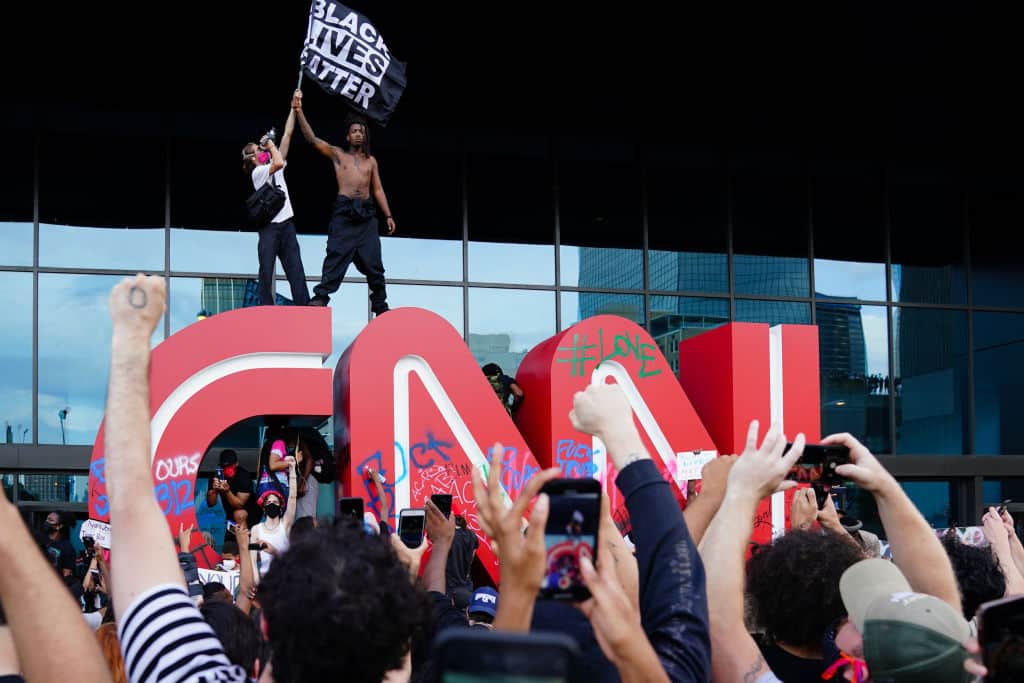 A man waves a Black Lives Matter flag atop the CNN logo during a protest in response to the police killing of George Floyd outside the CNN Center on May 29, 2020 in Atlanta, Georgia. (Photo by Elijah Nouvelage/Getty Images)
A man waves a Black Lives Matter flag atop the CNN logo during a protest in response to the police killing of George Floyd outside the CNN Center on May 29, 2020 in Atlanta, Georgia. (Photo by Elijah Nouvelage/Getty Images) “Where have all the flowers gone, long time passing …”
— Pete Seeger, 1955
“The line it is drawn, the curse it is cast … the order is rapidly fadin’ … for the times they are a changin’ …”
— Bob Dylan, 1964
What was there, in the aftermath of the Nazi apocalypse and the then-current Soviet gulag, that led Bob Dylan to believe it was our society that was cursed and fading?
Today, many of us who were around in the 1960s have a sense of déjà vu. Martin Luther King Jr. was assassinated in 1964. Riots erupted after his death in cities across the country. President Lyndon Johnson was so unpopular that he declined to be the party’s nominee in 1968. The Hong Kong flu pandemic, which broke out in 1968 and likely originated in China, caused an estimated 1 to 4 million deaths worldwide. Richard Nixon, who was viewed as highly divisive by Democrats and much of the media, succeeded Johnson as president in 1969, only to resign from the presidency in the face of certain impeachment.
For those of us shaken by our present woes, there is solace in the fact that America thrived after the upheavals of the 1960s. But there are serious questions as to whether our present political turmoil will alter many of the certainties that survived and indeed were nurtured by that now-distant past.
The free speech movement stood for the free, uncensored expression of ideas. It was birthed in opposition to university censorship, enunciated a universal goal and became a hallmark of 1960s liberals. We believed that the best defense against wrong information was right information. No more.
Today, censorship is rampant. Editors of major publications have lost their jobs, as have academics and local government and school officials, and even sports announcers for, in the words of The Wall Street Journal, straying in even minor ways “from the ferocious campaign of political conformity sweeping across” America. Joe Biden’s campaign has insisted that social media “change [its] hands-off approach to political speech,” and “fact-check” and censure “untrustworthy content” and “misleading information.” In threatening language, the Biden campaign has announced that should social media not comply, “we won’t stand for it.” Alas, factual accuracy often is in the eyes of the beholder.
King, in his famous speech at the Lincoln Memorial, insisted the “new militarism” must not “lead us to a distrust of all white people … [for] their destiny is part of our destiny.” He argued not for a narrow us-against-them paradigm, but for a fulfillment of the American dream: “We will be able to transform the genuine discords of our nation into a beautiful symphony of brotherhood … . [Then] all of God’s children, Black men and white men, Jews and gentiles, Protestants and Catholics, will be able to join hands and sing in the words of the old Negro spiritual, ‘Free at last! Free at last! Thank God almighty, we’re free at last!’ ”
In the 1960s, we liberals argued for the erasure of group distinctions.
We don’t hear that expansive prayer for brotherhood today, but rather, the divisive chant of “white privilege” that transforms whites in general into guilty enemies who must be brought down.
In the 1960s, we liberals argued for the erasure of group distinctions. Just before his death, King was planning a national occupation of Washington, D.C., to be called the “Poor People’s Campaign” — all poor people, not just Black poor people. Equivalent today would be the unheard rallying cry, “All Lives Matter.” Presidents Kennedy and Johnson signed executive orders that used the term “affirmative action” for the first time, and were intended to achieve nondiscrimination in employment. Today, “affirmative action” means discrimination on the basis of race.
This campaign against these traditional liberal values undermines free speech, democratic debate and cultural tolerance. Alas, these reflections lead me to think of the sad questions of Pete Seeger’s song iconic song, changing only a few words:
“Where have all the liberals gone, long time passing … gone to graveyards everyone … when will we ever learn, when will we ever learn.”
Gregory Smith is an appellate attorney practicing in Century City.























 More news and opinions than at a Shabbat dinner, right in your inbox.
More news and opinions than at a Shabbat dinner, right in your inbox.